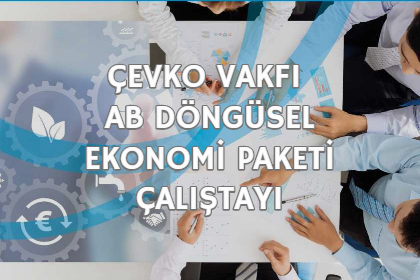
ÇEVKO Foundation’s workshop was held on 17th July 2018 with the participation of Mete İmer, General Secretary of ÇEVKO Foundation; General Secretary of the Business Council For Sustainable Development (SKD Turkey), Konca Çalkıvık; and Monika Romenska, Director of Corporate Relations for the Extended Producer Responsibility Alliance (EXPRA). Alongside these participants were officials of the Ministry of Environment and Urbanization, representatives of the member organizations of ÇEVKO Foundation, and managers of various organizations, unions and associations.
At the workshop, the EU Circular Economy Package was fully covered and information was given on the legal regulations to be carried out in the EU.
The EU Circular Economy Package foresees the transition to circular economy, which involves the processes of “sustainable production-sustainable consumption-recycling” from linear economy which means “buy-use-discard,” owing to the fact that the world population is increasing rapidly, and the world’s resources are limited in the face of the growing demand for products and services.
The package includes issues like supplying raw materials, production processes, the management of municipal, packaging, food, and construction waste and debris; storage areas, sea garbage; extended producer responsibility principles, financial incentives etc..The changes to the legal regulations regarding waste management in the package were approved in June 2018.
Mete İmer pointed out that the transition to circular economy would reduce the costs and provide new job opportunities in the fields of waste prevention, eco-design, re-use; and went on, “In circular economy, there is a need for more research and innovations in order to increase the industry’s competitiveness.” İmer explained that circular economy was a relatively new term not only for our country but also for the whole world, and that ÇEVKO Foundation was a natural pioneer for this term. He said, “The potential benefit chain of circular economy ranging from competitive advantages to new business models, to income and employment opportunities, to presenting the consumers with cheaper, stronger goods of good quality begins with the increase in awareness of recycling and waste management.
We are an authorized organization with the longest history in this area and our focus is to increase this awareness. The circular economy package is an important indicator that the business models in the world will change radically in the near future, the competition conditions will be revised according to the principles of the re-use of resources, recycling, and renewability.”
On the subject, Monika Romenska said that extended producer responsibility carried great importance in the EU Circular Economy Package and pointed out that a manual was being prepared that would act as a road map to show how the package would be used. She went on, “We are working in collaboration with our members including ÇEVKO Foundation in the preparation of this manual. We are going to present to the Commission application examples from different countries that we have compiled. Instructions are important. However, the road map regarding the applications will be put forth through the manual.”
Konca Çalkıvik, General Secretary of SKD Turkey, shared information on the Materials Marketplace, which is a platform that enables the exchange of inter-industry materials. The main targets of the platform are, to develop co-operation among the members, reduce the need for primary materials, to enable byproducts to be sold at fair prices; by reducing the total amount of waste, enabling the re-use and recycling of materials, and hence to reduce the costs of waste disposal. The platform works within the framework of circular economy, and is among the good application examples in Turkey.
An official of the Ministry of Environment and Urbanization of Turkey who attended the workshop and stressed the importance of the EU Circular Economy Package said, “All the targets are pointed towards 2030. The package provides new job opportunities alongside environmental improvements. For instance, a new provision was put on the Packaging Waste Management Regulation which was republished, stating that a certain amount of the produced materials should be obtained from the waste packagings that come up within the country. This is a statement appropriate to circular economy. This being said, we should take rapid steps towards increasing our achievements on waste and resource management.”
The official also pointed out the importance given to the topic of circular economy in public administration and went on, “A feasibility study is being carried out in our ministry to determine the real potential of our country. The Ministry of Industry and Technology and the economy management department also have strategies on circular economy. We are aiming at compiling all the strategies and reach a consensus, and we believe that all the planning will be clear in 3 years.”

